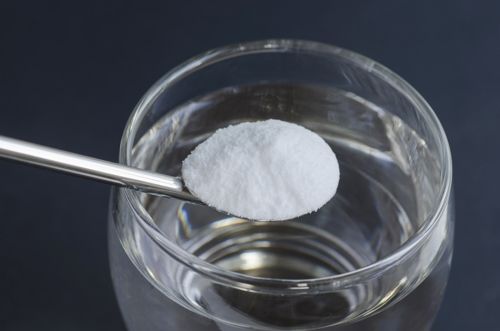Low Stomach Acid (Hypochlorhydria): Understanding the Digestive Impact of Decreased Gastric Acid Levels
Are you experiencing persistent digestive issues, unexplained fatigue, or nutrient deficiencies? The culprit might be lurking in your stomach - specifically, a lack of stomach acid. Low stomach acid, medically known as hypochlorhydria, is a condition that's often overlooked but can have far-reaching consequences for your health. In this comprehensive guide, we'll explore the symptoms, causes, and potential dangers of low stomach acid, as well as ways to address this common yet misunderstood condition.
For an in-depth understanding of low stomach acid and its impact on your health, our e-book "The Dangers of Low Stomach Acid" offers invaluable insights and actionable strategies. Throughout this article, we'll reference key points from the e-book, but for the full spectrum of information, we highly recommend downloading your copy today.
Understanding Hypochlorhydria: What is Low Stomach Acid?
Hypochlorhydria, or low stomach acid, occurs when your stomach doesn't produce enough hydrochloric acid. Stomach acid plays a crucial role in digestion and overall health. It helps break down proteins, absorb nutrients, and protect against harmful bacteria and parasites. When your stomach doesn't produce enough acid, it can lead to a host of health problems.
Our e-book "The Dangers of Low Stomach Acid" delves deeper into the physiological mechanisms of stomach acid production and its importance in maintaining optimal health.

Signs and Symptoms: Recognizing Low Stomach Acid
The symptoms of low stomach acid can be diverse and often mimic other conditions, leading to misdiagnosis. Some common signs and symptoms of hypochlorhydria include:
- Bloating and gas after meals
- Feeling full quickly
- Heartburn or acid reflux
- Undigested food in stool
- Weak, brittle fingernails
- Hair loss
- Chronic fatigue
- Recurring infections
If you're experiencing these symptoms, it's crucial to consider low stomach acid as a potential cause. Our e-book provides a comprehensive checklist of symptoms to help you identify if you might be suffering from hypochlorhydria.
The Hidden Dangers: How Low Stomach Acid Affects Your Health
What many people don't realize is that low stomach acid can lead to serious health complications if left untreated. Some potential dangers include:
- Nutrient Deficiencies: Without adequate stomach acid, your body struggles to absorb essential nutrients like vitamin B12, iron, and calcium. This can lead to iron deficiency anemia and other nutritional imbalances.
- Increased Risk of Infections: Low stomach acid compromises your body's first line of defense against harmful bacteria and parasites. This can make you more susceptible to gut infections and bacterial overgrowth.
- Gut Dysbiosis: An imbalance in gut bacteria can occur, potentially leading to conditions like Small Intestinal Bacterial Overgrowth (SIBO).
- Autoimmune Conditions: Some research suggests a link between low stomach acid and the development of certain autoimmune disorders.
- Bone Health Issues: Poor absorption of calcium and other minerals can impact bone density over time, potentially leading to osteoporosis.
Our e-book "The Dangers of Low Stomach Acid" provides an in-depth exploration of these health risks and offers strategies to mitigate them.

Causes and Risk Factors Associated with Low Stomach Acid
Several factors can contribute to low stomach acid production, including:
- Aging: As we get older, our bodies naturally produce less stomach acid.
- Chronic stress: Prolonged stress can interfere with normal stomach acid production.
- Certain medications: Proton pump inhibitors (PPIs) and other acid-reducing medications can lead to low stomach acid over time.
- H. pylori infection: Helicobacter pylori bacteria can reduce stomach acid production.
- Autoimmune conditions: Some autoimmune diseases can affect the cells that produce stomach acid.
Understanding the underlying cause of your low stomach acid is crucial for effective treatment. Our e-book offers a comprehensive guide to identifying potential causes and risk factors.
The Role of Hydrochloric Acid in Digestion and Health
Hydrochloric acid plays a vital role in your digestive process. It activates digestive enzymes, helps break down proteins, and creates an acidic environment that's inhospitable to harmful bacteria. When you don't have enough hydrochloric acid in your stomach, several issues can arise:
- Impaired protein digestion
- Reduced absorption of vitamins and minerals
- Increased risk of bacterial overgrowth
- Potential development of gastritis or stomach ulcers
Our e-book "The Dangers of Low Stomach Acid" provides a detailed explanation of how hydrochloric acid functions in your body and why maintaining proper levels is crucial for overall health.
Acid Reflux and Heartburn: A Surprising Connection to Low Stomach Acid
Counterintuitively, low stomach acid can sometimes lead to symptoms of acid reflux and heartburn. This occurs because low acid levels can cause the lower esophageal sphincter to malfunction, allowing stomach contents to reflux into the esophagus. Additionally, undigested food can sit in the stomach for longer periods, increasing pressure and potentially leading to reflux.
If you're experiencing chronic acid reflux or GERD (Gastroesophageal Reflux Disease), it's worth considering whether low stomach acid might be a contributing factor. Our e-book offers insights into the complex relationship between stomach acid levels and reflux symptoms.
Diagnosing Low Stomach Acid: Tests and Procedures
Diagnosing low stomach acid can be challenging, as the symptoms often overlap with other conditions. However, several tests can help determine if you have hypochlorhydria:
- Heidelberg pH test: This test measures the pH of your stomach using a small capsule with a radio transmitter.
- Gastric emptying studies: These can help assess how quickly food moves through your stomach.
- Blood tests: To check for nutrient deficiencies that may indicate low stomach acid.
- Endoscopy: To examine the stomach lining for signs of atrophic gastritis or other issues.
Our e-book "The Dangers of Low Stomach Acid" provides a comprehensive guide to these diagnostic procedures and can help you determine which tests might be most appropriate for your situation.

Natural Ways to Increase Stomach Acid
If you're looking to improve stomach acid levels naturally, several strategies may help:
- Apple Cider Vinegar: Some people find that taking a small amount of apple cider vinegar before meals can help stimulate stomach acid production.
- Betaine HCl Supplements: These supplements provide hydrochloric acid and may help increase stomach acidity.
- Digestive Bitters: Herbs like gentian and dandelion root can stimulate digestive secretions, including stomach acid.
- Lifestyle Changes: Managing stress, eating slowly, and avoiding large meals can all support healthy stomach acid levels.
While these natural remedies can be helpful, it's essential to consult with a healthcare professional before starting any new treatment regimen. Our e-book offers a detailed guide to natural interventions for gastroesophageal reflux and low stomach acid, including potential risks and benefits.
The Impact of Low Stomach Acid on Gut Health
Low stomach acid can have a significant impact on your gut health. The acidic environment in your stomach helps control the growth of bacteria and other microorganisms. When stomach acid levels are low, it can lead to:
- Bacterial overgrowth in the small intestine
- Increased risk of parasitic infections
- Imbalances in gut flora
- Inflammation of the stomach lining
Maintaining proper stomach acidity is crucial for a healthy gut microbiome. Our e-book "The Dangers of Low Stomach Acid" explores the intricate relationship between stomach acid and gut health in detail.
Treatment Options for Low Stomach Acid
The treatment for low stomach acid depends on the underlying cause and severity of your symptoms. Some potential interventions include:
- Addressing the root cause (e.g., treating H. pylori infection)
- Supplementing with betaine HCl or other digestive enzymes
- Dietary modifications to support digestive health
- Stress management techniques
- In some cases, reducing or discontinuing acid-suppressing medications (under medical supervision)
It's crucial to work with a healthcare professional to develop a comprehensive treatment plan tailored to your individual needs. Our e-book provides an in-depth discussion of various treatment options and can help guide you in making informed decisions about your health.
Preventing Low Stomach Acid: Lifestyle and Dietary Considerations
While some causes of low stomach acid may be beyond your control, there are steps you can take to support healthy stomach acid production:
- Eat a nutrient-dense diet rich in zinc and B vitamins
- Manage stress through relaxation techniques or mindfulness practices
- Avoid overeating and eating too close to bedtime
- Limit consumption of processed foods and alcohol
- Stay hydrated, but avoid drinking large amounts of water with meals
Our e-book "The Dangers of Low Stomach Acid" offers a wealth of information on dietary and lifestyle strategies to support optimal stomach acid levels and overall digestive health.

The Baking Soda Test: A Simple At-Home Assessment
While not definitive, the baking soda test is a simple at-home method that may provide clues about your stomach acid levels. Here's how to do it:
- On an empty stomach, mix 1/4 teaspoon of baking soda in 4-6 ounces of cold water.
- Drink the mixture and time how long it takes you to belch.
- If it takes more than 5 minutes to belch, it may indicate low stomach acid.
Remember, this test is not a substitute for professional medical advice or diagnosis. For a more comprehensive understanding of stomach acid testing and interpretation, refer to our e-book.
In Conclusion: Taking Control of Your Digestive Health
Low stomach acid is a complex condition with far-reaching implications for your overall health. By understanding the symptoms, causes, and potential dangers of hypochlorhydria, you can take proactive steps to support your digestive wellness and overall health.
Our e-book, "The Dangers of Low Stomach Acid," is an invaluable resource for anyone looking to deepen their understanding of this condition and take control of their digestive health. It offers:
- Detailed explanations of how low stomach acid affects your body
- Step-by-step guides for identifying symptoms and potential causes
- Natural remedies and lifestyle changes to support stomach acid production
- When to seek professional help and what tests to consider
- Long-term strategies for optimal digestive health
Don't let low stomach acid compromise your health any longer. Download our e-book today and start your journey to better digestive health and overall wellness.
Remember, your digestive health is the foundation of your overall well-being. By addressing low stomach acid, you're taking a crucial step towards optimal health and vitality. With the information provided in our e-book and the guidance of a healthcare professional, you can develop a comprehensive strategy to support healthy stomach acid levels and improve your overall quality of life.
More SIBO and Gut Health related articles on Viva Fresh Food
SIBO Diet: 28-Day Meal Plan for Small Intestinal Bacterial Overgrowth
The Hydrogen Sulfide Connection: Understanding Your Gut's Secret Gas
The Hidden Dangers of Low Stomach Acid: A Comprehensive Guide to Hypochlorhydria
Methane SIBO Foods to Avoid: Your SIBO Diet Guide
SIBO Symptoms: Understanding Small Intestinal Bacterial Overgrowth & Causes




